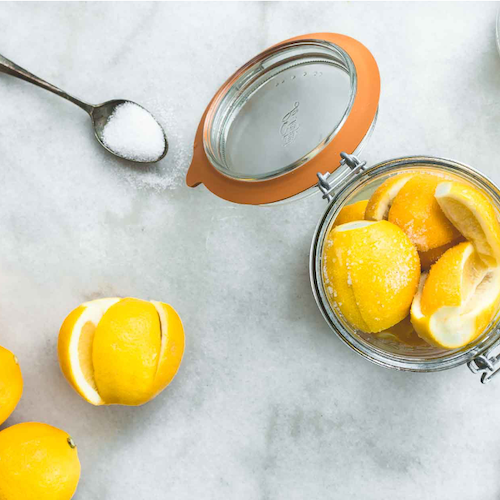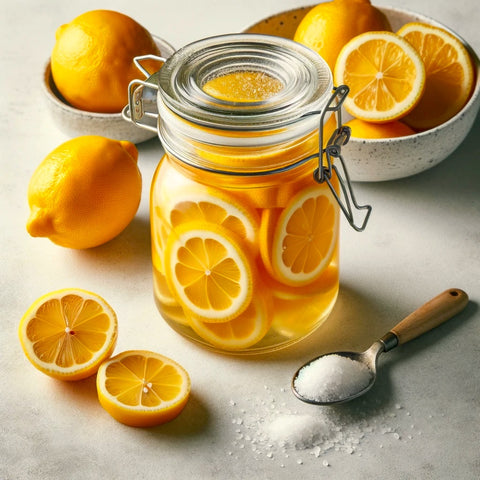
Seasonal Recipes: Preserved Lemons - A Winter Citrus Delight
Share
Welcome to the vibrant world of seasonal cooking where the zesty tang of citrus brightens up our winter meals. While lemons are a staple in kitchens worldwide, there's a special charm to using them during their peak season. Winter's bounty brings us the freshest, juiciest lemons, perfect for our antioxidant-rich preserved lemons recipe inspired by Persian and Vietnamese culinary traditions.
Why Winter is the Best Time for Citrus Fruits
In our modern day world, it’s easy to find citrus fruits at almost any time of the year, but did you know that winter is the best time of the year for citrus and lemons? It is when citrus fruits are the most plentiful, and therefore the cheapest, so it’s a great time to stock up on these antioxidant powerhouse fruits. Lemons are rich in vitamin C, Potassium, and vitamin B6, as well as many compounds that have positive effects on the cardiovascular system, not to mention possibly helping prevent cancer and inflammation. These compounds are present in the whole fruit, not just the juice, which is another reason why we love the traditional uses of this recipe that use the entire fruit (even the peel!). Plus when you use the whole lemon you get the added benefits of fiber, and none of the food goes to waste.

The Joy of Fermenting at Home
You may already know that fermented foods are great for gut health, but why go to the trouble of fermenting foods yourself? One good reason is that you can get a greater variety of fermented foods by doing it yourself. Sure, you may be able to find these types of preserved lemons at a local international market, but when you do it yourself you can use any type of citrus you like. Doing it yourself also means you get to control all the variables, and it gives you a chance to connect with food in a different way.
Truthfully, these types of projects are simple and easy to put together once you have a reliable recipe, and then you get to sit back and watch the magic happen. Watching the fermentation process happen over a period of days, weeks, or even months, can give you a new appreciation into how your food is made and the time that goes into making products you might usually just pull off a shelf at the grocery store.
Preserved Lemons Recipe
I enjoy homesteadingfamily.com as a great resource for healthy recipes, many of them vegetarian or vegan, and for all things homemade. This recipe is an adaptation of one found there!
What you’ll need:
- 6-10 lemons, chopped (save juice from this step and add to jar)
- 5 tsps salt
- 1 quart mason jar with sealable lid
- Extra lemon juice to cover lemons (if needed)
How to make it:
- Make sure all of your equipment has been washed well with hot water and soap to prevent contamination. Scrub lemons with hot water thoroughly to clean them. Cut them into chunks and place them in a bowl. Save any juice that is released from chopping the lemons and place in the mason jar.
- Sprinkle a few teaspoons of salt over the lemons. Transfer the lemons and any liquid released from them into the jar and pour in the remaining salt. Use a wooden spoon to compress the lemons in the jar and release some of the juice. If the lemons are not submerged after this step, add extra lemon juice to cover them.
- Store in a cool, dark place and flip the jar every 12 hours to prevent mold growth. After about 5 days you can leave them to ferment further without anymore flipping of the jar. They will develop full flavor after about a month of fermentation, after which you can store them in the refrigerator.
As with any fermentation project, it’s good to keep an eye out for any mold growth or signs of contamination. Any gray coloration to the fruit or liquid can be a sign that the batch has gone bad and should be thrown out.
These preserved lemons can be used in place of fresh lemon in any recipe that calls for lemon. The sugars from the lemon get consumed by bacteria during the fermentation, producing a more savory flavor profile that’s more complex than fresh lemon. Try them in your next home-cooked meal, or even chop one preserved lemon up finely and muddle it into a cocktail or mocktail for a unique and refreshing beverage.

About Author: Stephanie is the current fulfillment director and kitchen supervisor for Organic Pharmer. She studied Neuroscience at University of California, Irvine before studying Naturopathic Medicine for 2 years at National University of Natural Medicine in Portland, Oregon. She also spent 3 years studying East Asian Medicine at the same university.
